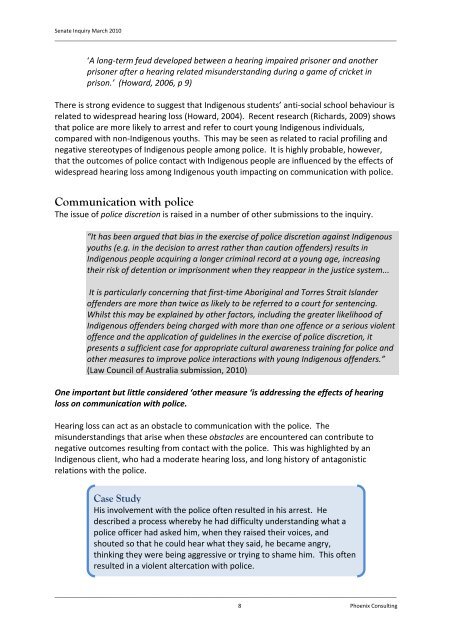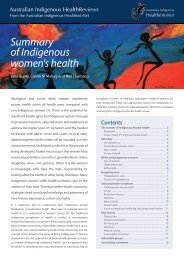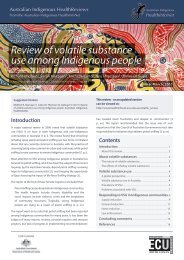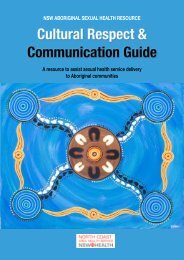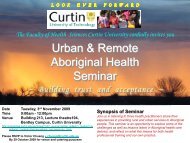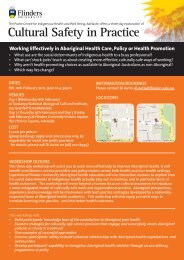hearing loss and the criminal justice system - Australian Indigenous ...
hearing loss and the criminal justice system - Australian Indigenous ...
hearing loss and the criminal justice system - Australian Indigenous ...
You also want an ePaper? Increase the reach of your titles
YUMPU automatically turns print PDFs into web optimized ePapers that Google loves.
Senate Inquiry March 2010_________________________________________________________________________________________________________________‘A long‐term feud developed between a <strong>hearing</strong> impaired prisoner <strong>and</strong> ano<strong>the</strong>rprisoner after a <strong>hearing</strong> related misunderst<strong>and</strong>ing during a game of cricket inprison.’ (Howard, 2006, p 9)There is strong evidence to suggest that <strong>Indigenous</strong> students’ anti‐social school behaviour isrelated to widespread <strong>hearing</strong> <strong>loss</strong> (Howard, 2004). Recent research (Richards, 2009) showsthat police are more likely to arrest <strong>and</strong> refer to court young <strong>Indigenous</strong> individuals,compared with non‐<strong>Indigenous</strong> youths. This may be seen as related to racial profiling <strong>and</strong>negative stereotypes of <strong>Indigenous</strong> people among police. It is highly probable, however,that <strong>the</strong> outcomes of police contact with <strong>Indigenous</strong> people are influenced by <strong>the</strong> effects ofwidespread <strong>hearing</strong> <strong>loss</strong> among <strong>Indigenous</strong> youth impacting on communication with police.Communication with policeThe issue of police discretion is raised in a number of o<strong>the</strong>r submissions to <strong>the</strong> inquiry.“It has been argued that bias in <strong>the</strong> exercise of police discretion against <strong>Indigenous</strong>youths (e.g. in <strong>the</strong> decision to arrest ra<strong>the</strong>r than caution offenders) results in<strong>Indigenous</strong> people acquiring a longer <strong>criminal</strong> record at a young age, increasing<strong>the</strong>ir risk of detention or imprisonment when <strong>the</strong>y reappear in <strong>the</strong> <strong>justice</strong> <strong>system</strong>...It is particularly concerning that first‐time Aboriginal <strong>and</strong> Torres Strait Isl<strong>and</strong>eroffenders are more than twice as likely to be referred to a court for sentencing.Whilst this may be explained by o<strong>the</strong>r factors, including <strong>the</strong> greater likelihood of<strong>Indigenous</strong> offenders being charged with more than one offence or a serious violentoffence <strong>and</strong> <strong>the</strong> application of guidelines in <strong>the</strong> exercise of police discretion, itpresents a sufficient case for appropriate cultural awareness training for police <strong>and</strong>o<strong>the</strong>r measures to improve police interactions with young <strong>Indigenous</strong> offenders.”(Law Council of Australia submission, 2010)One important but little considered ‘o<strong>the</strong>r measure ‘is addressing <strong>the</strong> effects of <strong>hearing</strong><strong>loss</strong> on communication with police.Hearing <strong>loss</strong> can act as an obstacle to communication with <strong>the</strong> police. Themisunderst<strong>and</strong>ings that arise when <strong>the</strong>se obstacles are encountered can contribute tonegative outcomes resulting from contact with <strong>the</strong> police. This was highlighted by an<strong>Indigenous</strong> client, who had a moderate <strong>hearing</strong> <strong>loss</strong>, <strong>and</strong> long history of antagonisticrelations with <strong>the</strong> police.Case StudyHis involvement with <strong>the</strong> police often resulted in his arrest. Hedescribed a process whereby he had difficulty underst<strong>and</strong>ing what apolice officer had asked him, when <strong>the</strong>y raised <strong>the</strong>ir voices, <strong>and</strong>shouted so that he could hear what <strong>the</strong>y said, he became angry,thinking <strong>the</strong>y were being aggressive or trying to shame him. This oftenresulted in a violent altercation with police._________________________________________________________________________________________________________________8 Phoenix Consulting


